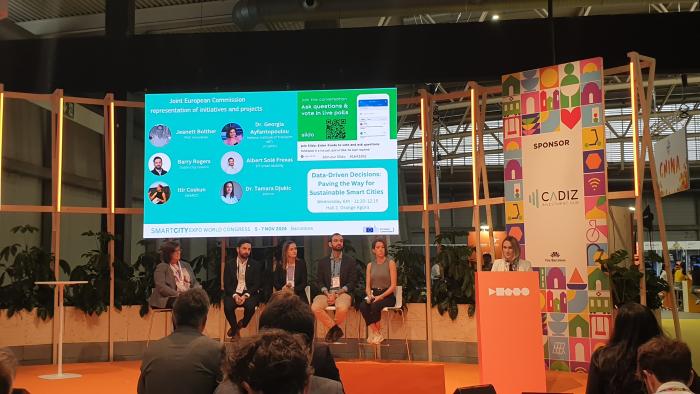
At the Smart City Expo World Congress on November 5, 2024, an insightful Agora Session titled "Data-Driven Decisions: Paving the Way for Sustainable Smart Cities" explored how harnessing data can transform urban mobility and contribute to the creation of more sustainable, efficient, and livable cities.
Held between 11:30 and 12:15, the session brought together an expert panel of speakers from various sectors, including urban mobility, innovation management, and city planning. Among the notable speakers were Jeanett Bolther, Team Leader of Transport, Mobility & Logistics at PNO Innovation, Tamara Djukic, Head of Green and Urban Mobility at ERTICO, and Barry Rogers, Head of the Dublin City Tourism Unit.
The session focused on the vital role that data-driven approaches play in shaping urban environments, particularly in the areas of smart tourism, urban logistics, and public transport. The discussions revolved around how data can optimise decision-making processes, enhance sustainability efforts, and streamline urban services.
Key Takeaways from the Session:
- The Role of Data in Shaping Sustainable Cities The speakers emphasised the importance of using data to inform urban planning and mobility decisions. Jeanett Bolther highlighted that data removes assumptions from the equation, offering city planners and architects accurate, evidence-based insights. “Without data, we are essentially blind. It’s crucial for predicting demand and forecasting future needs in urban environments,” she explained.
- Public-Private Partnerships A major theme throughout the session was the push for stronger public-private partnerships (PPPs) to implement sustainability policies at the local level. The speakers argued that for these collaborations to be truly effective, a neutral orchestrator is needed—someone who can manage the relationship between public authorities and private entities to ensure mutual sustainability and urban innovation goals are achieved.
- Digitalisation as a Backbone – But Not Enough Alone The role of digitalisation as a foundation for smart cities was a key point in the discussion. However, the panellists agreed that while digitalisation provides the technological backbone, it is insufficient on its own. Itir Coskun from SWARCO stressed the importance of integrating digital tools into decision-making processes, rather than relying solely on technology. “Data must inform policy and action in a way that aligns with broader urban sustainability goals.”
- Visualising Data for Public Engagement One of the significant benefits of data, as noted by Georgia Ayfantopoulou from the Centre for Research and Technology Hellas (CERTH), is its potential to improve community engagement. She explained that visualising data can help residents better understand urban planning processes and provide feedback. “When data is presented in an accessible way, citizens can see how decisions are made and actively participate in shaping the future of their cities,” Ayfantopoulou said.
- Challenges: Digital Literacy and Data Privacy Despite the many advantages, there were also discussions about the challenges cities face in implementing data-driven policies. Barry Rogers of Dublin City highlighted the issue of digital literacy, particularly in less tech-savvy communities, where the interpretation of data can be a significant barrier. Furthermore, data privacy was identified as a key concern. Ensuring that citizens’ privacy is protected while still benefiting from the power of data is a challenge that needs careful consideration.
- The Need for Shared Data Spaces and Capacity Building A recurring point in the discussion was the need for shared data spaces and enhanced capacity building to help cities interpret and use data effectively. Blanca Yáñez Serrano from EIT Urban Mobility stressed the importance of building the necessary skills and knowledge within local authorities. “Many cities lack the internal capacity to fully leverage the data they collect. We need to support them in developing the tools and expertise required to make data-driven decisions.”
- Best Practices and Policy Integration The panel also discussed examples of successful data-driven urban mobility projects and the role of policy integration in making data more actionable. The experts agreed that aligning data collection efforts across sectors—whether in tourism, logistics, or transport—is key to creating smarter, more sustainable cities.
The session concluded with a call for greater collaboration between cities, private companies, and citizens to unlock the full potential of data in urban mobility and sustainability. Speakers highlighted the importance of data as a tool to inform better decision-making, improve public services, and build more resilient cities. However, they also stressed that data must be accompanied by the right governance structures, public engagement, and capacity-building to ensure its successful implementation.
As cities around the world move towards becoming smarter and more sustainable, the use of data will be a critical enabler of this transformation. The discussions at this session demonstrated that while data offers incredible opportunities, its effective application requires a coordinated effort from all sectors to address challenges like digital literacy and privacy concerns and ensure inclusive access to data-driven solutions.
